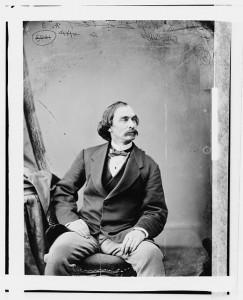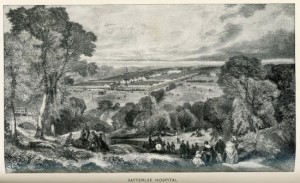Surgeon and Explorer Reports on Latest Exploit; Does not Ask for More Money Because War’s On
From The New-York Times November 15, 1861:
ARCTIC EXPLORATIONS.; Lecture of Dr. J.S. Hayes before the New-York Geographical and Statistical Society. DR. HAYES’ REPORT.
A great throng of the beauty and intelligence of our City assembled Wednesday evening in the spacious and elegant lecture-room of the New-York Historical Society, near the corner of Second-avenue and Tenth-street, to listen to the Report which the celebrated Arctic explorer, Dr. J.S. HAYES, had been invited to make public there before the Geographical and Statistical Society. The hall was filled in every part as early as 7 o’clock, and the proportion of ladies among the audience was unusually large.
Rev. Dr. JOSEPH P. THOMPSON, the Secretary, then welcomed the distinguished guest in an eloquent and touching address, which Dr. HAYES, when the renewed applause that greeted him had subsided, appropriately responding, acknowledged as follows:
MR. PRESIDENT, LADIES AND GENTLEMEN: It is with feelings of profound pleasure and satisfaction that I meet, to-night, the members of the Geographical Society, the contributors to the Arctic fund, and the ladies who honor us and the occasion with their presence. I come before you to render an account of the use which I have made of the generous confidence which, in concert with citizens of Philadelphia, Boston and Washington, you have given me, in placing under my charge an enterprise having for its object the completion of one of the most important scientific explorations at present engaging the attention of men. I thank you for your cordial reception, and I shall ever treasure it in my memory, and in it will always find ample reward for whatever of privation my sixteen months’ absence may have cost me.
I trust that you have not forgotten the last occasion upon which I had the honor to meet you in this hall, and I want words to express the pride and gratification with which I am assured, by your friendly reception of me this evening, that, amid the cares and anxieties which, as patriotic citizens, you must all feel in the war which has threatened the integrity of the Union, you have found leisure to extend a welcome to, and to express your sympathy with, myself, my companions, and Howard [?] our little expedition.
Since we last met in this hall great changes have taken place. When I left the regions of eternal ice, I little dreamed that a powerful rebellion was desolating my country, and that civil war was raging among a people which I left prosperous and happy. This great national calamity alters the relations under which we now meet. Had there been peace, I should have come before you to solicit a continuance of your countenance and influence in aiding the further prosecution of Arctic discovery; but for the present I cannot think of it. The day has come when the Republic has a right to demand the time, the money, the energies, and, if need be, the life upon the battle-field, of even the humblest of her citizens. …
We had heard no certain news of events at home, excepting through some papers seen in a Greenland port, and they narrated merely the incidents transpiring up to the close of March last, including the inauguration of the new President. On our way to Halifax, we resorted to a device to obtain intelligence in the stormiest weather from a passing vessel. In the midst of a severe blow, a ship steering eastward, and consequently, as we thought, coming from some port on the American Continent, was passing near enough to read written inquiries.
So, we painted in huge black letters, on a piece of canvass, the question, “Is there war in the States?” and placed our bulletin over the side next to the strange vessel. Some one on board of her read it and replied by writing on her quarter with chalk, the simple word, “Yes!” and in this way and to this extent only did we obtain the eagerly desired information. [Hilarity and applause.] …
According to Wikipedia Isaac Israel Hayes may have misrepresented some of his findings so that he could claim that his expedition had reached the highest latitude ever. He also claimed to have seen the fictional Open Polar Sea. It is true that after he returned in 1861, Hays commanded the 4500 bed Satterlee Hospital in Philadelphia. It was one of the largest Union hospitals during the Civil War. The Sisters of Charity provided the nursing. The hospital did good work (assuming no one was cookin’ the books):
By May 1864, Satterlee had treated more than 12,000 patients and suffered only 260 deaths, a remarkable accomplishment considering the sanitary conditions of the day.
The American Geographical Society was founded in 1851 in New York City.


